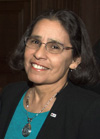Professor Valencia-Weber Tackles Legal Services Issues
August 3, 2012

Nearly two years ago, Professor Gloria Valencia-Weber made history when President Barack Obama appointed her to the Legal Services Corporation (LSC) board of directors. Since 1974 LSC’s congressional charge has been to provide quality civil legal services to indigent Americans. Valencia-Weber was appointed to contribute her expertise in Native American law and communities, which had not been available in past directors.
Nationally and in New Mexico, the LSC mostly deals with family law issues and keeping people in their homes during the difficult economic environment.
The first priority, set by President Obama, was for the board to rebuild legal services nationwide from the efforts of previous administrations to defund the governmental nonprofit corporation. Another priority has been to ensure programs are in place for returning veterans from Iraq and Afghanistan to restore their lives.
In addition to working closely with her colleagues on a broad range of initiatives, Valencia-Weber organized a workshop at the Tulalip Indian Reservation in Washington state. The Legal Services board members, most of whom had no previous knowledge of Indian law, tribal law or sovereign Native government, were hosted by the Tulalip tribe. They met with tribal court judges and LSC Native American service lawyers from Washington, Idaho and California. They also enjoyed a tour of the reservation, where they visited a new government center and could compare new housing with previously built HUD housing.
“This event exposed the board to the status of Indian law in the United States,” said Valencia-Weber. “They got a sense of the struggle to deliver justice in Native American communities and were impressed with the caring way tribes deal with their problems.”
Valencia-Weber also has contributed her expertise in immigration law. In 2010, she co-authored with Professor Antoinette Sedillo Lopez a paper, “Stories in Mexico and the United States about the Border: The Rhetoric and the Realities”, which appeared in the Intercultural Human Rights Law Review.
She is writing another paper addressing the situation of the cross-border tribes. Many tribal homelands straddle the U.S.-Mexico border, and Valencia-Weber is looking at how a closed border affects the ability of tribal members to maintain ordinary lives on both sides of the border.
The LSC board meets regularly with the 136 LCS grantees across the country, and everywhere she has been Valencia-Weber has reconnected with alumni from the UNM School of Law and the Pre-Law Summer Institute at the American Indian Law Center.
“I’m busier than I ever imagined and I’ve learned a lot,” she said. “There was no learning curve, it was just straight up.”
Valencia-Weber has been impressed with the collaborative quality and high level of commitment from the 11-member board, which includes the dean of Harvard Law School and the most recent Black president of the American Bar Association, among other esteemed board members.
“I am proud, personally, and for New Mexico, to be among the two career law professors on the board,” she said.
